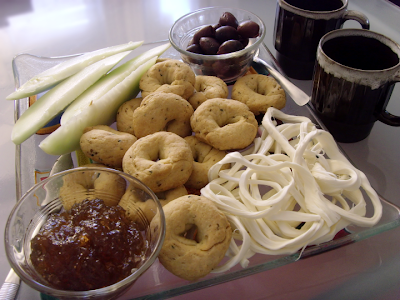Background
Syria's strategic location in the Middle East made it a prime annexation target for numerous empires. In recent times this has been part of the Ottoman Empire, and then under French control until its independence after World War II. Syria is a predominantly Muslim country.
Wikipedia's article on Syrian cuisine simply notes that appetizers are eaten for breakfast, leaving a wide variety of options. A Taste of Syria focused our choices with a chapter on breakfast and by specializing on the cuisine of Aleppo, a city in the northwest of Syria near the Turkish border. The authors provide several menus. One option is sliced cucumber, lebaneh dip, cheese, olives and pita. Lebaneh is a yogurt mixed with dried mint and garnished with olive oil. Another menu is mamuneh'ya with cheese and pita. Mamuneh'ya is semolina porridge flavored with cinnamon. We chose to go with ca'ak served with Syrian cheese, fig jam, and honeydew melon. Ah'weh turkieh is Turkish coffee heavily sweetened with sugar.
The exotic ingredients for this meal are mahlab and semolina. Mahlab are black cherry pits. Semolina is the particles of wheat bran from durum wheat. It is also the only tetraploid wheat variety that is in broad use.
Syrian cheese is a string cheese is flavored with mahlab and caraway seeds. The cheese is made using goat or sheep's milk. It is often labeled "Armenian string cheese" in markets. It can be made at home but only in large quantities, so we bought it. The Armenian store we went to in Watertown was closed on Sunday, but fortunately we had the halal Al-Hoda Market near our house for the cheese and semolina.
Ca'ak
We reduced our recipe by 1/3 and got about 18 pieces. The full recipe is given below and the book estimates a yield of around 8 dozen.
- 1 packet yeast
- 1¼ cups warm water
- 1 tsp sugar
- 2 cups semolina
- 3 sticks salted butter (4 oz each)
- 1½ tsp baking powder
- 1 tbsp mahlab (powdered)
- 1 tbsp anise
- 1 tbsp fennel seeds
- ½ tbsp black caraway seeds (kalonji)

- Mix yeast, warm water, and sugar. Set the mixture aside.
- Put the remaining ingredients into a large bowl and mix.
- Add the yeast mixture and mix well.
- Cover the bowl with a cloth and keep in a warm place for 1 hour.
- Preheat the over to 350°F.
- Roll the dough into balls 1¼ inches in diameter. Start with 15 pieces and leave the rest of the dough covered to prevent drying.
- Roll the ball into a finger shape four inches long.
- Bring the ends together so they overlap and pinch them together.
- Places them ½ inch apart on a cookie sheet.
- Cook for 40 minutes until they are golden brown.
- When the cookies are done turn off the oven and leave the cookies in it for an hour to crisp.
Coffee
We still do not have an apparatus for making Turkish coffee. We approximated it by brewing espresso and putting 2 teaspoons of sugar at the bottom of the cup. Pour the espresso over the sugar but do not stir it in.
Results and Discussion
The smell of the baking ca'ak is amazing. It was an act of will to let them finish cooking. The final cookie is very crisp and can be crumbly. The cherry flavor from the mahlab is not very noticeable when the ca'ak are warm but they develop the next day when they cool. Ca'ak are savory and the fig jelly complements them nicely. The fennel and anise hit your palate a little after the other flavors, similar to the cumin cookies we had for Nepal.
The mahlab was a nice surprise. The whole cherry pits have absolutely no smell, but when you grind them they have a pure clean cherry smell. I have a lot of it leftover seeds and I look forward to experimenting with it as a flavoring agent in ice cream.
The Syrian cheese is a string cheese flavored with kalonji and mahlab. Eating string cheese was a lot of fun and eating really long string cheese is even better. The cheese also peeled into much thinner strings than American string cheese. It goes especially well with the olives.
The coffee was very strong and very sweet. The book warned that most Americans would find the amount of sugar Syrians put into their coffee much too strong. The authors were right. Each sip was a shock to my rather delicate system. (Yeah, I knew what was up and skipped the sugar altogether. Both or none, IMO. –Kitty)

No comments:
Post a Comment